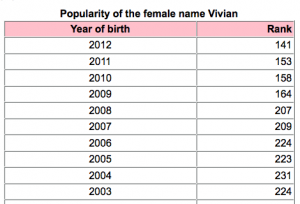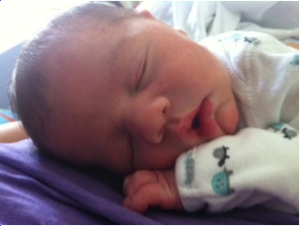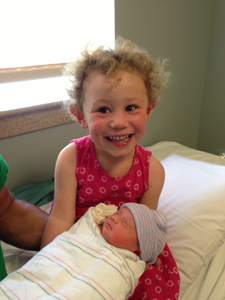A. writes:
I’m a new father writing to seek some advice, or perhaps consolation, for my baby name regret I am suffering over my 4-month-old son.
His name is Dean. My wife and I named him after my maternal grandfather, who is still alive and lives three hours away from me.
Here’s the catch.
My grandfather spells his name Deane.
In the beginning we talked about family names (although this is not necessarily a tradition in our families) and both liked the name Dean, agreeing that it met our guidelines for being short, masculine, unique and not trendy. We both agreed we liked the more common spelling (“Dean” without the extra “e”.), in large part because our last name is so frequently mistaken for a similar-sounding surname. We figured it would be best to keep spelling as simple as possible.
While I’m not terribly close to my grandfather, he is someone I admire, having been a great husband to my grandma and family man. In other words, he’s an excellent candidate for naming your son after.
Momentum just rolled toward the name Dean. As time wore on, however, I grew worried about how my grandfather would respond to the spelling change. I think I mostly kept the anxiety to myself. Then, when my wife was 8 months pregnant, I suggested we spell it “Deane,” like my grandfather, or consider another name. This angered her greatly. She had fallen in love with the name Dean, and was also firmly opposed to spelling it Deane. She got feisty. I back tracked and submitted.
The next day, at my wife’s suggestion, I called my mom to talk it over with her. My mom told me that Grandpa wouldn’t care and that “your grandpa would probably prefer his grandson not bear the burden of having that extra “e” on the end.” She said he had grown tired of being called “Deanne” and “Deanie” by people who didn’t recognize the name. (He also regularly gets mail for Deanne).
So we agreed to Dean. On the day he was born, I had a lot of anxiety (which I kept to myself).
For the record, no one in the family has said anything bad. My grandfather has been very understanding (at least outwardly) and has shown no sign of disappointment. He regularly asks my mom about “Little Dean” and says he enjoys receiving photographs. In fact, after a day where he was called “Deanne” one too many times, he told my parents “I’m so thankful that my great-grandson doesn’t have that “e” on the end.”
Still, I continue to have the same fears I did beforehand, that:
1) We were jerks and bad family members for even considering changing the spelling in the first place because using a family name is so sacred.
2) We somehow insulted my grandfather by not going with the original spelling. (I imagine that after a lifetime of having to remind people that you have an “e” on the end of your name, the ultimate insult is when your great-grandson is named after you, but without the “e.” My mom says that I am wrong here.)
I coped for the first three months. But lately it has caused me enough torment that I sank into depression and am in therapy for it. It’s the only thing I can think about and it keeps me up all night long. I simply can’t sleep. It’s such an awful thing to second guess your son’s name around the clock. Especially when he is named after your own grandfather and you bear so much guilt over it.
My wife says changing the name in any way is out of the question and that I am being irrational. Otherwise she has been very supportive and has put up with a lot of grief.
I don’t know what to do, and his full name, which I am declining to reveal, lends itself to no obvious nicknames.
and
I have a rather severe case of baby name regret, but the name cannot be changed. I could write a novel on my name regret. I’ll spare you most details except that the child is 9 mos old and he is named in honor of my 86-year-old grandfather.
The regret has caused me all sorts of guilt, feelings of failure and mental anguish, which my wife and I are trying to work through.
I’ve done some online research on “name regret,” which is how I found your website. Most of what I have read on your site and others are accounts of women who experienced acute name regret, perhaps as a result of post partem depression, and got over it once the depression lifted. I’ve also seen accounts of women who changed the child’s name and were very relieved. But I haven’t seen any accounts of women who kept the name and just learned to live with it, even if they didn’t like it. (Perhaps because no one wants to admit publicly that they don’t like their kid’s name.) I’ve also yet to find accounts of men going through this, which makes me feel rather alone.
In your blog experience, have you ever spoken with parents who were able to put their regret behind them and just learn to live with it? If so, what was their experience like.
I worry that this is going to haunt me forever. I hope that when he is 5, I’m not still living in regret.
I would love to hear that other parents went through this too and that eventually it passed and they were able to cope with it.
Thanks for any consolation you can offer.
In my experience, name regret is rarely about the baby’s name. If you’ve examined my site as well as other sites, you HAVE read posts where the parent got over it, and you HAVE read posts where the parent just learned to live with it, and you HAVE read posts where the parent changed the name and the change did not bring relief—but you have found reasons to disregard them all. You’re thinking that if you were to find the perfect post that reflected your exact situation, THEN you’d feel better, but I think that’s a false goal: if you did find a post reflecting your exact situation, you would find a reason to disregard that as well. Let’s say you found a post by a man talking about his agonizing regret and saying that he then learned to live with the name—how would that help you learn to live with it? What if you found a post by a man who had NOT learned to cope? Would that help you? Why?
I remember your first letter. You gave your son the right name on many levels and for many reasons, and everyone thinks so except you (including your grandfather, who would have hated it and perhaps even felt guilty if you’d used the other spelling he hated so much). If everyone important to you is telling you you absolutely did the right thing, will it help to have a stranger say the same thing? If so: You did the right thing. If you had named him Deane, you would likely be going through the exact same crisis now, wondering if you should have named him Dean.
With issues of this sort, the usual suggestion is not for the person to try to stop thinking about it (“trying not to think about it” = useless), but instead for them to focus their attention on something else. Focus on your darling son, whose name could be Carrot for all that matters. Focus on your wife, who has spent her first 9 months as a mother babying you as well as her baby. Focus on your grandfather, who has been honored and has specifically said he’s relieved you didn’t go with the other spelling. If you must, turn your attention briefly to larger depressing matters, to give you a sense of how truly unimportant this issue is in the big picture. Many people find some relief with volunteer work.
Or try thought exercises. Let’s say you have given him the worst possible name. You haven’t, but let’s pretend for a moment that your worst fears are realized and you REALLY DID GIVE HIM THE WRONG NAME. Now realize this: it STILL doesn’t matter. It’s just a name. Names are not “sacred”; names are collections of sounds used to help us tell people apart. Your grandfather didn’t spell his name Deane; his PARENTS spelled it Deane—to his lasting inconvenience and irritation. No one thinks taking away the disliked/inconvenient E is “the ultimate insult,” and why would they? If you wanted to insult your grandfather, and you thought long and hard about the absolute best way to show him your intense scorn and dislike, would you have done it by naming your son Dean? Did you chuckle evilly as you filled out the birth certificate, saying, “THAT’LL show the old man how much I despise him!!”? No.
In my own struggles with misplaced anxiety, I have found it helpful to imagine that someone is coming to me with the same problem I am having. Imagine reading your own letter, written by someone else: this other man’s grandfather was named Frances, but he’s named his son Francis because that’s the traditionally male spelling and his grandfather always hated his name spelled with the E and wished his name was Francis. Now he’s worried he’s basically stabbed his grandfather in the back and then poured in some acid to make sure he REALLY felt the wound, even though in real life the grandfather wiped his brow and expressed relief that his grandson went with the right spelling. Would you agree that the writer should be in such agony? Would you agree that in a situation where nothing can be changed, the people involved can productively spend their time feeling horrible about it?
I have also found it useful to ask myself this question: “What is it you WANT?”—and then to ask myself why I want it and whether I can have it. It sounds to me like what you want is to go back in time and use Deane instead of Dean, AND for that to be what everyone else (your grandfather, your wife) wants too. The reason you want it is that you think it’ll make you feel better, and the answer to whether you can have it is no. Or do you want to read your grandfather’s mind, so as to be reassured that he REALLY DOES think it was best to name your son Dean? You can’t have that, either. Do you want to be individually reassured by every person on the planet that you did the right thing? No again. Is there anything you want that you CAN have? Aim for those goals.
Think of all the countless generations that have come before you, since the time humans started referring to each other by name. Think of all the women who have married men whose families had naming traditions, and all the parents who got bullied into using a name they didn’t want to use. Think of all the situations where you can tell there had to have been serious compromises: a child is named Richard but called Jack, or named Edgar but called Jason. Believe me when I say that you are not the only one who didn’t/doesn’t like his or her child’s name. Some people HATE their children’s names, and of course they don’t discuss it: they don’t want to hurt the child’s feelings. They know the child is more important than the name.
It doesn’t matter if your son’s name doesn’t lend itself to a nickname. Call him Buddy. Call him Partner. Call him Sport. Call him Little Guy. Call him Honey. Call him Sweetie-muffin. Call him Son. Call him Ol’ Blue/Green/Brown-Eyes. Call him Lovey. Call him D. Call him Captain McStinkyBritches. Call him anything that rhymes with what you’re saying to him (“Let’s go, Joe” and “Time for school, McCool”). Call him Biscuit. Call him Bear. Call him Bean. Call him Cheeks. Or call him Dean/Deane, because they’re identical when said aloud.
If it helps, imagine that you didn’t name him after your grandfather. No, you just named him Dean because you and your wife both loved the name and agreed on it. And, coincidentally, how nice: the name has a very positive association for you because it reminds you of your grandfather’s name.
I too hope that you are not still living this way when he is five. As a parent, one of your biggest challenges will be keeping things in perspective. There will be many, many opportunities in your son’s life for you to be wracked with guilt and uncertainty, and many, many opportunities for you to cope with situations where a decision (either yours or someone else’s) is not changeable and your only option is to brush your hands together briskly and say, “Welp, I guess since we can’t go back, we have to start from where we are!”
But let me tell you this, and I want you to listen to me carefully: You gave him the right name. AND IF YOU HADN’T: it would still be absolutely fine.






